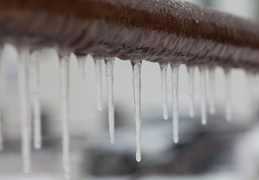 We won’t go as far as saying frozen pipes are inevitable, but if you don’t take the proper steps to prevent against them then they may very well be inevitable. Unfortunately, they can cause quite a bit of damage if they’re not dealt with the right way. This is because as the water in the pipes thaw, a negative pressure buildup occurs, putting pressure on the walls of the pipe and leading to cracks or even burst pipes.
We won’t go as far as saying frozen pipes are inevitable, but if you don’t take the proper steps to prevent against them then they may very well be inevitable. Unfortunately, they can cause quite a bit of damage if they’re not dealt with the right way. This is because as the water in the pipes thaw, a negative pressure buildup occurs, putting pressure on the walls of the pipe and leading to cracks or even burst pipes.
To protect your plumbing from freezing in this way, there are a few steps you can follow. Keep reading to learn more about what you can do to prevent this in the first place, and be sure to contact our team if you do wind up with damaged plumbing.
Open Your Outdoor Faucets
Naturally, the pipes most susceptible to freezing are the ones outside your home. If you have any outdoor faucets—perhaps used for sprinkler systems or hoses—be sure to shut off their water flow. Then, open the faucets, drain excess water from them, and leave them open. You might even want to pick up some insulated caps for the faucet openings and your hoses.
Also, when you disconnect your hoses, you should ensure they’re drained too, and then stored in a relatively warm and dry space—perhaps your garage or a tool shed.
Insulate Your Plumbing
There are other pipes you use in your home that aren’t outdoors and that you use regularly, but are sensitive to freezing temperatures. For these pipes, you can’t simply open the faucets and shut off the water supply—this typically includes pipes under sinks, in crawlspaces, and in basements.
In order to protect these pipes from freezing, the easiest and best thing for you o do is invest in some pipe insulating sleeves from your nearest hardware store. This helps keep the temperature of the water in the pipes from dropping too low. You can accomplish this with towels, as well, if you’d rather go that route. The most important factor here is that you try to keep the pipes as warm and insulated as possible.
Keep Bathroom and Kitchen Cabinets Open
You may be wondering why on earth we’d say this, but bear with us! Plumbing fixtures in the bathroom and kitchen areas are typically under sinks, right? And they usually run behind walls that face outdoors. That means that these pipes are prone to freezing.
However, if you leave the cabinets where these plumbing fixtures are located open, then the warmth from your heating system will reach them, and they’ll be less likely to freeze.
“Help! My Pipes Froze Anyway!”
If this occurs, it’s important that you contact professional plumbers to handle the situation. Attempting to thaw the pipes on your own may cause more harm than good to your plumbing system, and can cause injury since those pipes can burst, as we mentioned above. Please don’t hesitate to give our team a call when you notice this problem.
Established in 1912, Max Sr & Paul Schoenwalder Plumbing, Heating and Air Conditioning, A Corp. is your trusted resource for professional plumbers in New Providence, NJ. Contact us today!
